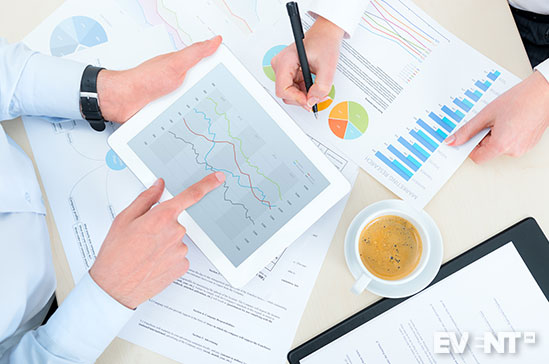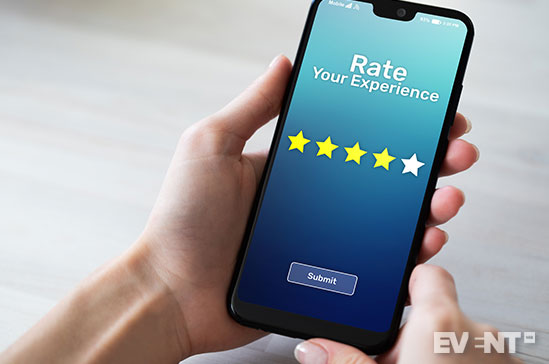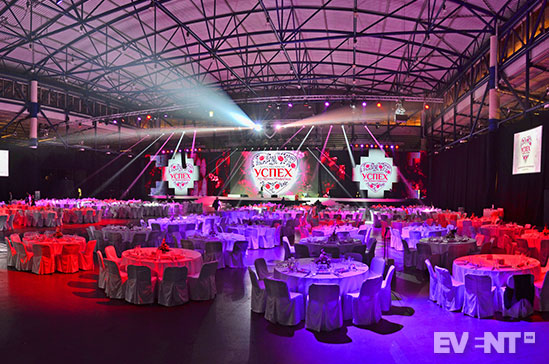This is a sponsored post by Omnience. More information about Event Manager Blog’s sponsored posts.
As long as there are events, planners will be around to ensure they run smoothly. However, the corporate meeting and event landscape is shifting – in major ways – so the role of the event planner is evolving alongside it. The good news is that the future of event planning looks bright for those willing to anticipate the trends driving these industry-wide changes.
Venues and Vendors


CURRENT STATE
Data, experience and social movements are currently shaping the decisions that event planners make regarding venues and vendors.
Currently, planners choose venues based on capacity, amenities and best pricing. This formula has proven to not always lead to the best outcomes. The increased demand and necessity for wifi has become an on-going request from attendees due to many event planners deciding to integrate social media and other cool new event tech into their program. In turn, this has made it challenging to stay within budget while also being able to deliver flawless internet-integrated experiences on-site at the event. Attendees and planners both rely so heavily on the internet that they often become lackluster when they cannot share their excitement at an event immediately with their friends and family. A delay may reduce the volume of what they share or may prevent them from sharing altogether, which would negate much of the planned engagement.
In addition, today’s event planners are looking to be more environmentally responsible, more tech savvy, and more innovative in terms of entertainment and engaging experiences to meet attendees’ interests.
Making environmentally conscious choices, such as choosing LEED certified venues, are becoming industry norm as these facilities become available. Attendees are also increasingly interested in extensive recycling programs and the overall reduction of waste from events.
Choosing event vendors and suppliers that are compatible with these new standards and capable of offering the types of experiences you want your attendees to enjoy can be difficult.To make these decisions, more event planners are arming themselves with data to make informed decisions as well as examining a supplier’s current and future offerings to decide whether to select them as vendor partners.
FUTURE OUTLOOK
It is expected that the significance of data analysis as well as tech savvy offerings, both from vendors and venues, will continue to be a driving force for planners in selecting who they choose to work with. Vendors and venues that have continued to keep up with the demands of attendees will be visible via the data in performance metrics and attendee reviews. These key indicators will be apparent to the event planner via data analysis technology, allowing event planners to also be more involved in negotiating customizations for each event based on their analysis and event demographics.
Event Tech


CURRENT STATE
New event tech is born daily and the options for event planners are often overwhelming. Event tech is currently being used as a “must have” to facilitate conference registration and other event functions, many of which are captured within event apps (such as agendas and venue maps).
However, there are so many new tools specifically for planners that it is easy for the event planner to become overwhelmed integrating this tech into their planning process. Incompatible and/or overlapping technologies can reduce the efficacy of current workflows and existing systems. This might also make it harder to determine the ROI of implemented technologies by making it difficult to assess which application was effective at achieving the goal.
Another current tech affliction for event planners involves not software, but rather hardware. Managing events means managing the tools that are used to design and analyze, but also the tablets used at the registration desk, the displays used throughout the event, and so on. Event planners need to be cognizant of the limitations of these devices and also the appropriate handling for maximum functionality.
FUTURE OUTLOOK
We predict that, in the future (and we are seeing it happen now), the tech titans of the events industry will buy out smaller event tech software and create full-fledged catalogs of event tech, tailored for specific types of events and conferences. This will allow the event planner to buy into a platform that manages each different aspect of event planning, data analytics, and logistics without having to piece disparate softwares together. As we have seen social media event tech integrate, the future will demand that other digital event tools take a bigger stance in our industry.
Among other places, we expect to see these pop up in the following areas:
- Referral marketing
- Influencer marketing
- RFID
- Interactive floor plans
The future event planner will be well experienced with project management software; certifications in specific softwares will potentially be a marketable skill for event planners. They will also need to be able to not only utilize these new software products, but use them to maintain pristine organizational skills.
Analytics


CURRENT STATE
Analytics create pictures of event performance in areas like the efficacy of marketing and engagement strategies. Currently, planners rely on sources like post-event surveys and comparative registration rates. These numbers hold invaluable information about the individual event and how it performed based on expectations.
However, there is still room for improvement in this area, as event planners seek to know more about the individual attendee experience and efficacy of experiential marketing.
FUTURE OUTLOOK
While the post-event survey isn’t going anywhere, event planners are looking at a wider scope of data to analyze possible areas of development and success. They will be expected to use analytics to determine the best performing ads, platforms, and techniques and to develop key metrics for the ROI of those efforts.
Going forward, event planners will need to be even more strategic and tech savvy to understand the modern issues they face and how to use the available tools to solve them. Not unlike event tech, we expect to see a rise in accreditations for analytic software, and for this to be a highly marketable skill for the event planner of the future.
Engagement


CURRENT STATE
Everywhere we look, we see the emphasis on attendee engagement making waves in how we approach event planning and design. With “increased visibility” being the name of the game, it’s no wonder that the expectation is not only to host an exceptional event, but to tastefully encourage attendees to share their exceptional experience with the world on social media.
The popularity of live activations are increasing each year, and attendees are bringing heightened expectations to events of all sizes. Today’s event planner has the difficult task of balancing expectations while also delivering Instagram-worthy design and evoking maximum engagement.
FUTURE OUTLOOK
Innovative tools and high-tech solutions will combine problem solving with interactive experience trends. Event planners will increasingly look to attendees for insight into how they want to interact with the event. The event planner of the future won’t simply tell attendees what they will experience; instead, they will let the audience drive the event design to carefully curate the attendee experience.
Here are some ways we expect to see this growth:
- Crowdsourced information
- Augmented Reality experiences
- Empowered scheduling
- Interactive keynotes, exhibits and networking
Marketing


CURRENT STATE
The industry is beginning to see shifts in marketing strategy with larger portions of event budgets being allocated towards event marketing specifically. With visibility being key, this is laying huge pressure on event planners to step up and create plans proportionate to these significant funds.
Today’s event planner has to manage many roles with often overlapping duties. They often also have to generate content, direct social media and digital marketing campaigns, and analyze data at the event end—all of this in addition to their traditional duties of event design, logistics, and vendor and venue management. This often happens because they know their events best, and sometimes better than their internal marketing teams.
FUTURE OUTLOOK
An evolving list of KPIs will be the event planner’s best friend when measuring their efforts and building a picture of performance for investors. As event planners continue to evolve to hold more control over the marketing for a brand’s portfolio of events, it will ensure that they are aligned in both messaging and culture.
Event planners will have to learn to do the following in order to understand their marketing direction:
- Evaluate performance metrics such as click rates, open rates, and A/B testing results
- Keep up with industry influencers
- Keep up with trends on the macro and micro levels to ensure they are always presenting fresh visuals and copy to represent their events


IN CONCLUSION
The modern event professional is responsible for not only upholding the standard skills that form the foundation of their job, but also bringing a higher level of understanding to optimizing each section of an event. With the willingness to elevate strategies and use new tools available, the future of events will take planners in exciting new directions.






